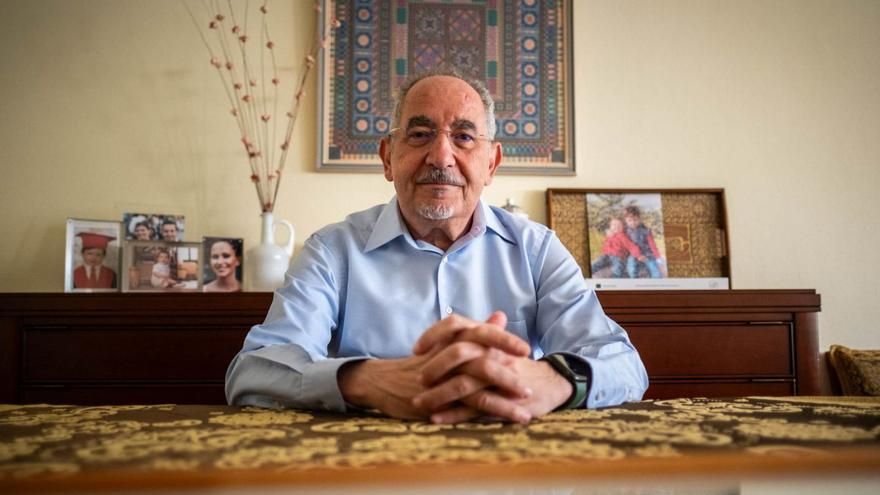
Bilal Halawa was born in the city of Nablus, in the West Bank. He is now in the living room of his house in Santa Cruz de Tenerife, where he has been living for over 40 years. The room is decorated with three paintings of different sizes with the typical print of Palestinian costumes. They are geometric figures, some similar to flowers, harmoniously drawn on the fabric with shades of orange and blue. He is a retired doctor specialising in otolaryngology. As a legacy of his Arab roots, he feels a deep affection for his family. On the dresser, there are frames with photos of his children and grandchildren, of whom he proudly speaks. They were born in the Islands but Bilal has always tried to remind them of their origins. He values sight more than words, so they have made trips to Jordan to at least be close to their origin (West Bank) so that his children can experience their Arab tradition.
Bilal Halawa’s story is written amidst conflicts and his parents’ escape during the Nakba. This is the term used to describe the Israeli Army’s military invasion in 1948 that forced thousands of Palestinians to flee their land. For Halawa’s parents, it meant leaving their city, Jaffa, abandoning the family business and starting a new life with their 11 children. Today, they are spread across the globe: Canada, the United Arab Emirates, Jordan, and Tenerife. The doctor ended up here by chance. He went to Seville to study medicine, took the MIR exam, and was assigned to Candelaria Hospital, where he worked for 35 years. Bilal was aware of a Canarian-Palestinian community that was settled on the Islands and, upon his arrival, he met several individuals who, for various reasons, had been drawn to the Archipelago. He acknowledges the warm reception they received and only identifies Palestinians by their typical names and surnames from there. “Palestinians, in general, integrate perfectly wherever they go. Not having your homeland and it being occupied, wherever you go, you consider it yours.”
The last time he visited the West Bank was in 1966. He has not returned and will not do so. Going back to what was once his home involves hours or even days at the border, enduring interrogations and mockery before being allowed in for a strictly defined period. This is the experience that some of his close friends have had and one that the doctor does not want to endure. “I don’t feel like it because the mistreatment Israeli authorities subject people to at the checkpoints is unbearable.” For him, entering the West Bank is like entering a cheese riddled with colonies. It’s being at home without truly being home.
From his life in Palestine, he recalls what his parents told him and the songs his mother recited, who “had a talent for music and a beautiful voice.” Now in Canarias, he claims to be physically in the Archipelago but always keeping an eye on what is happening in the Middle East. He is filled with frustration and incomprehension at the international community’s lack of effort to end the massacre of thousands of people. “The one who has the right to defend themselves is the one who has been under siege and death for 76 years. That is us, not them,” states Bilal Halawa.
His mind is focused on “the injustice and violation of human rights happening in Gaza.” Always paying attention “to a genocide where the majority of those killed are women and children.”
















